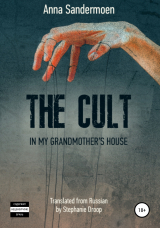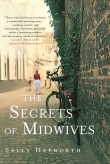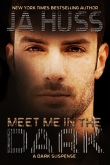
Текст книги "The Cult in my Grandmother's House"
Автор книги: Анна Сандермоен
сообщить о нарушении
Текущая страница: 1 (всего у книги 4 страниц)
Анна Сандермоен, Kjetil Sandermoen
The Cult in my Grandmother's House


CONTENTS
Introduction by Kjetil Sandermoen
Foreword
1. Before the cult
2. Brainwashing
3. I’m a pioneer. I’ve been chosen. I’m happy
4. I’m a superhuman. Life in the underground
5. The clinic in leningrad
6. Breaking point
7. I was not to be a superhuman after all
Epilogue
P.S. Aunt Katya’s story
ANNA SANDERMOEN
THE CULT
IN MY GRANDMOTHER’S HOUSE
Translated from Russian
by Stephanie Droop
Managing Editor: Anna Sandermoen
Translation to English: Stephanie Droop
Technical editing: Elena Tonkova
Cover design: Varvara Shalito, Evgeniya Kornienko
Layout and design: Evgeniya Kornienko
Cover photo: Artem Matsevich
© Sandermoen Publishing 2021
© Edition in English, design: Sandermoen Publishing 2021
ISBN: 978-3-907131-53-4
For distribution of books, contact: Sandermoen Publishing
e-mail: post@sandermoen.com
All rights reserved. No part of this book may be reproduced, stored in any way, or transferred to third parties in any form or by any means – electronic, mechanical, photocopying or recording – without written permission from the publisher.

This book by Anna Sandermoen is a true story of life in the commune of V. D. Stolbun. The author recalls the dramatic childhood she spent in the Stolbun cult and explains its ideology, including its attempts to create a new race of superhumans, and ultimately how this dream collapsed.
Intended for a wide audience.
18+
Contains profanity.
Introduction by Kjetil Sandermoen
The story you are about to read was written by my dear wife Ania. It is a true story about a large part of her childhood, and I am sure it will move and impact you.
Among a lot of incredibly shocking anecdotes in this book, the one that touched me the most is where Ania describes how she was sent back to her grandmother’s house, so full of happy and joyful memories, only to find it full of strangers living there in what turned out to be a cult, and her loving grandmother now treating the young girl as if she was an unwanted stranger. That Ania has chosen to call her book The Cult in my Grandmother’s House is probably evidence that this particular part of her story affected her deeply as well.
When I met my wife and she eventually told me just a little bit about her background of growing up in a cult, I must admit I had to discuss with myself how this could have given rise to fears and problems that she would bring with her into our relationship.
Ania is a very strong and proud person and it is not her habit to focus on the negative aspects of life. The childhood stories that she usually shares with friends and family are the fun and nostalgic ones. However, I know that the years taken from her childhood spent in a cult is a painful past that she will always bring with her. I have therefore encouraged her to write this book about these years. It can stand as a warning to any adult who would contemplate joining a cult or a sect, or – as in Ania case even worse – sending your child away to a cult. I believe that writing the book is also a part of a healing process for Ania. It is a story worth writing down and indeed a story worth reading.
Any kind of cult is dangerous and destructive. The core of a cult is sectarianism, which is the idea that members of the cult are convinced that their salvation and success, based on their particular objectives, aggressively require to find converts from outside the cult in order to succeed with their political, religious or ideological project. It is always based on a very oppressive hierarchy, almost always under the dictatorial leadership of a charlatan whose motives are dominance, power, and sexual and material privileges.
The cult that Ania describes in this book is in my opinion extraordinarily dangerous since it claims it can cure disorders like schizophrenia and fatal diseases like cancer. The idea was that children are spoiled and become “weak” by being brought up by their parents and therefore have to be taken care of by strangers. Illness is (according to this cult) a result of negative thinking by weak humans. The leader claimed that the whole world was suffering from schizophrenia (he made a big market for himself). Only his wisdom could cure it.
These ideas were unfortunately in unison with the prevailing ideology of the USSR where they wanted to diminish the family and replace it with upbringing by the Communist Party to create the Homo sovieticus. In the USSR people were also readily accused of being schizophrenic and sent away for forced “treatment” if they had the courage to stand up against this totalitarian system.
I have observed that still today any mental disorder is nonchalantly labelled “schizophrenia” in Russia. It is as if it is not completely understood that this is a very serious, disabling and incurable psychiatric disorder. Schizophrenia involves a number of serious problems with thinking, behaviour or emotions and it requires lifelong medication and treatment. I am absolutely confident that very few – if any – members of this cult were actually suffering from schizophrenia. However, they were manipulated into obedience and treated with ridiculous methods by dilettantes.
As I understand it, this cult still exists and practices its unauthorised “treatment” in the middle of Moscow.
The worst emotional pain a child can experience is to feel abandoned by her parents. Children do not have a choice. A child cannot choose her parents and she cannot choose what is done to her. However, even when let down and treated unfairly, children are equipped with an incredible ability to love their parents. I know that Ania does not feel any hate towards her parents or anyone else. It is not up to me to cast judgments about what Ania parents did to her. The times and the conditions in the USSR were so completely different from anything I myself grew up with, that I can hardly comprehend it. I do believe however, that Ania feels disappointment and an emptiness in her heart where the love for her parents should have been. I do my best to help Ania in finding a perspective in this regard. The best healer however would have been just an honest, “I am sorry for what happened, we did wrong to you”. That would have meant a lot for Ania.
Read, reflect and learn from this excellently written book.
Kjetil Sandermoen,
September 03, 2019
Zug, Switzerland
Foreword
Under tyranny it is much easier to act than to think.
Hannah Arendt, philosopher
WHO AM I?
I am a capricious, selfish, critical and permanently dissatisfied little bitch. I’m a materialistic, opportunistic animal, always calculating a few steps ahead. I’m a bourgeoise. At least, this is what I was assured of right from childhood, extensively and persistently, and, I must admit, very successfully.
But once, to my great surprise, my husband told me he liked the fact that I wasn’t some spoilt little European thing, but a steely Russian with a good (albeit a little strange) sense of humour.
I was 39 years old when he proposed to me, and I thought it would be dishonest on my part to unite my life with a person without telling him about my past, about my childhood. I wouldn’t be able to keep silent about this all my life, and if I told him it in snatches, then he might have formed an incomplete or even wrong impression of me. That might have been fine if he was Russian – Russians aren’t fazed by most far-out stories. But he is Norwegian, and he was raised in a decent family, in the sort of abundance I never dreamed of, and, most importantly, surrounded by love and care. A decent environment gave him moral guidance; wealth fostered his severe self-discipline; and love and care made his heart responsive. Therefore, he became not only a reliable partner and a rich man, but also a good father, husband and lover.
I had to go a long way before I found myself.
After all, when adults raise children incorrectly, the children cease to love not the adults, but themselves.
I wrote my story especially for my intended husband. And I was preparing myself for him to change his mind about marrying me after reading it. But that did not happen.
Could it be that if a person is able to coherently describe a situation, it means they have coped with it?
A CULT WITHIN A CULT
I used to get annoyed when friends and acquaintances questioned me about my childhood. Every time I started to answer, someone would immediately interrupt me, and from their very first question it was clear they didn’t believe me. Or the question was so painful that I got angry and snapped at them. And sometimes I myself began to doubt whether I was telling the truth: maybe I had embellished it, maybe my memory was distorted over time under the influence of emotion. More than once I tried to check by asking someone else who was in the cult with me as a child. Unfortunately, not only did everyone I ask confirm my memories, but they also added their own.
However, when talking with people who came to the cult as adults, I noticed their impressions differed from the memories of those who had spent their childhood there. Moreover, they can be divided into several types.
Some experienced guilt and did not hide it. It was obvious the memories were very unpleasant for them. In my opinion this is the normal reaction of a normal person.
Others avoided direct answers, answered inappropriately, or turned everything into an angry, sarcastic joke. They didn’t want to remember. My stepfather was one such. In principle, this is also a normal reaction, although it indicates indifference and a lack of empathy.
Still others, instead of actually answering, insulted me. This was the majority.
A fourth group rolled their eyes meaningfully, as if to say I must be narrow-minded and limited not to understand the deeper meaning of everything that happened there. Like I didn’t get it while I was there, and I never got it after that. They didn’t manage to cure me. It was of people like this that the backbone of the cult consisted. Everything rested on them. And it rests on them to this day.
Only now, having left Russia forever, am I beginning to realise that all those sectarian attitudes have spread everywhere, and continue to spread, like mould…
We left the cult, we condemned it in words, but it remained in us and with us; we continued to live according to its principles. We judged things in the same way, we treated ourselves in the same way, we thought in the same categories, we acted with the same attitudes and built our lives in accordance with them. Our fear of the unknown, of what we cannot control – mental disorders, physical illness and death – is primordial and nurtured by a system inherited from the concentration camp conditions of the Soviet Union.
And every time I tried to dissociate myself from this, to simply physically move further away, I was “kicked out” from the team, as if making it clear:
“We don’t need another you. If you are not completely with us, then you are against us. So you are the enemy.”
A 40-YEAR JOURNEY
The first time I made notes about my childhood in the cult was when I was 23, just so as to not forget the details. I already knew then that it would be something of a thought experiment on myself. And I also knew that what I wrote down as memories was true, but what I wrote down as evaluation was not true. But back then I didn’t know other words. I didn’t know how to name my emotions, or how to cope with them. I couldn’t label them. I was only 23, and there was no one around to help me sort out my feelings. I was driven by a desire to recall at least something good about my family, about my parents who had sent me to the cult. I tried my best to find an excuse for them.
Now I’m 45. I no longer live in the USSR, I no longer even live in Russia. My daughter is already 15. My family is now also completely different; it is Scandinavian and Swiss. My husband is Norwegian and we live in Switzerland. My husband has his own business, his own private university and business school, and I have my own business in publishing books. We are committed to educating people.
I moved to the West not only physically, but also mentally. And now I only ever look East out the corner of my (narrowed) eyes.
Sometimes an insignificant event can suddenly turn your view and interpretation of your whole life upside down. The way you used to define your life – how you set priorities and inferred causal relationships – suddenly changes radically. Quite unexpectedly you see in each of your past decisions and actions some kind of mistake, which only now acquires systemic status. Previously, when it was your implicit belief, it was impossible to even see it, let alone understand it.
And now you watch as everything you guarded and clutched like a precious jewel through storms and hurricanes suddenly collapses like an avalanche, smashing to useless dust all those intellectual constructions you naively considered the foundation, the cornerstone of your personality – in a word, that on which your self-esteem and dignity were based. You always thought it was what gave you the strength and right to walk the earth with your head held high and your shoulders squared. And then – that’s it. You no longer have a foundation. It’s all dust. Zilch.
Do many people go through this? How many times in a lifetime? And how long does it take for a reasonable person to learn what is dust and what isn’t?
It so happened that for me the turning point was emigration: a change of country, environment and culture. Emigration let me look back at the past and see it in a new way, as if from outside. And, of course, meeting my future husband was the catalyst that set off this whole sequence of changes in my intellectual perspectives and perceptions.
For many years I didn’t know how to talk about the cult. On one hand, it seemed to contain something great, brilliant and necessary for all humanity. On the other hand, there was a constant whisper inside me that no, something wasn’t right… Until I had a daughter, I attributed this vague misgiving to ignorance; it was more convenient to think I was simply not intelligent enough to understand the full depth and true meaning of what went on. But then my daughter was born, and when she reached the age at which I entered the cult, I suddenly, and to my own surprise, completely revised my attitude to what had gone on there and to the people connected with it.
It must be said that my husband understood from the second sentence of my story that I had been in a cult. I needed almost 40 years.
WHY I WROTE THIS BOOK
I want to tell you about my experience and how my way of thinking has changed. How at first I was delighted with the ideas promoted by the cult of Viktor Davydovich Stolbun, and how then I realised what was really behind them.
My story is about at what price a person learns to think, not so much critically as independently. It is not difficult to criticise, but the ability to find the best solutions requires not only a good education, but also a lot of courage.
This is a story about how much ignorance costs us. It is about how not to bring up children. It is about what happens in the soul and psyche of a small child.
I want to tell the truth, the truth about a cult that did not disappear with the collapse of the USSR, that larger “cult” which had made it all possible. I want to tell the truth, as true as any memory or life experience can be.
This book is not fiction. It contains only facts from the childhood I spent in a cult.
For many years I held an internal discussion about whether it was worth publishing this truth. I kept expecting one of the “adults” would do it – after all, I was a child when I was there. But no one came forward, and the cult continues to exist to this day in the very centre of Moscow. Even in Switzerland, where I now live, there are followers of Stolbun’s “teachings”.
Now it is headed by another person, Vladimir Vladimirovich Streltsov, the son of Stolbun’s wife, and its members actively promote themselves on Russian social networks and continue to attract new clients. Previously, they “treated” mainly alcoholism, drug addiction and schizophrenia, but now they also say they treat tuberculosis.
There is a lot of information on the Internet, but it is scattered and sometimes fundamentally incorrect. I decided to collect between the covers of one book what I know myself, using people’s real names.
WHO THIS BOOK WAS WRITTEN FOR
For my husband, to tell him the story of my childhood, which differs significantly from his own. People say things like: Europeans are so pampered, they are completely unaware of the hardships of life. They say: there’s no point even trying to tell them, they still won’t understand. I disagree. It probably depends on the person. It’s possible to be pampered and never face the problems I did, and at the same time remain a person with not only curiosity but also a big heart – a heart with enough space for both my stories and the feelings associated with them… Might this attitude even be the expression of true love?
For my daughter, for her to know the conditions in which her mother grew up and developed as a person, and thereby better understand me.
She said recently,
“Mum, sometimes I catch myself thinking that I’m afraid of growing up and becoming different from you…”
“How do you mean?”
“Well, you had such an interesting life, you say such interesting things… But many of my friends have mothers who are… well, there is absolutely nothing to talk to them about… And nothing dramatic has happened in my life either, and will probably never happen. I have everything, no problems… unlike your life, so rich and interesting! I’m afraid my life will be boring and I won’t be able to tell my children anything interesting about myself.”
“So I’m protecting you from the trials that fell to me. Now I know what the price is! It means a lost family and loneliness. It means wasting many years of effort serving other people’s interests. It means ruined health. It means a short life. You will definitely have other stories, and I hope they will be warm-hearted, funny and, not least, instructive for those who have less experience than you.”
This book is also for anyone who would like to hear the truth about how people lived once upon a time in a cult in the USSR, and what it meant to be a child in such a commune.
Finally, the book is for me myself, to relive the experience, to rethink it, and ultimately to let it go and to step back, having turned over this page of my life.
I tell the story from two points of view: that of a child growing up in a cult and that of an adult who has experience of both parenting and emigration. I remember what I faced and how I felt as a child, and I share my present thoughts about the past. I track the evolution of my attitudes and thoughts to show how easy it is when you are young to fall into a trap, and how difficult, and sometimes impossible, even over the years, to get out of it.
Everyone will see something of their own in this story. I am a philosopher by education; I like thinking, reasoning and looking at things from different angles. Write to me and let me know what you think about all this!
1. Before the cult
NOTHING IS SHOCKING IN CHILDHOOD
Everything that happens in childhood seems normal. Children have no choice: adults decide everything for you and you can only go with the flow, trying to adapt and survive. As the years pass and you grow up, your memory returns time and again to episodes from childhood, and questions start welling up inside…
What was the point of that? Why would they do that?
When you compare your own experience of being a parent with that of your own parents, you start to wonder:
Would I have acted like that with my own child? What about with someone else’s?
You come to see more and more that there is no difference between your own child and others, especially when you grew up with other children yourself, without your family —although you knew you had one.
A PRISON FOR ACADEMICS
I was born in Dushanbe and spent my early years there, until my parents left to live and work in Leningrad. My memories of my birth town are childishly picturesque, symbols of home: my grandma, warm air, aroma of fruit, flies in the kitchen, traditional pechak sweets, the “Green” bazar, cool linoleum on the floor, vinyl records, the smell of books, our loggia with its huge mirror, babbling irrigation channels right in the street, the asphalt melting, our hip bath, whole alleyways of roses, weeping willows, vines hanging over your head, tea with mulberry, fragrant flatbreads with sesame, cherry orchards, sandstorms, and of course, the opera! Grandma often took me to the opera, which was considered the heart of the town (at least that’s how I remember it).

Tajik State Academic Opera and Ballet Theatre named after Sadriddin Aini. Founded in Dushanbe in 1936.
The Russian-speaking circle in Tajikistan at that time was mainly members of the intelligentsia, forcibly exiled from the major Russian cities. This included my relatives. My grandfather was the son of an enemy of the Soviet state, who was shot during Stalin’s reign of terror, and the whole family was now living under this stigma. My mother’s side of the family weren’t allowed to live in Leningrad, where they were actually from. For a while the family lived just outside the forbidden 100-kilometre radius which stretched around the desirable cities, but after that we were packed off to the most remote Central Asian republic to “colonise the virgin lands”. My grandparents, as academics and professors, were sent to found and build a local university in Dushanbe. For this they received a meagre salary and an adobe shack with no amenities, right in the university’s internal courtyard. My mother and uncle grew up there. Nobody complained (it just wasn’t done in the Soviet Union), and to this day my mum is convinced that the family chose to live in Dushanbe of their own free will. Back then everyone was obliged to be happy and grateful to the Communist Party, whatever happened.
AUNT OLYA CARMEN
When I was born, my grandmother already had her own apartment, “kindly” donated by the Soviet government. It was in a three-storey building and even had a cold tap and plumbing. Her and my grandfather were divorced: he had gone to live and work in Kyrgyzstan, where later he headed up the geological institute. Grandma continued to teach at the Dushanbe university and to look after the children (my mum and her brother) as before.
I lived the first years of my life in my grandmother’s apartment. We had a neighbour called Aunt Olya. I knew her very well: she lived right underneath us, in the same sort of apartment. Actually, all the inhabitants knew each other, as there were only six apartments in this building of ours on Ulitsa Lakhuti.

Aunt Olya was something special. She sang in the opera. When we went to see Carmen I would wait on the edge of my seat for her appearance. On the stage she would metamorphose from the average woman I usually saw her as into a real firebird: the flamboyant Carmen, with gorgeous hairstyles and dresses, vivid makeup and the stirring sound of castanets. She would dance, clacking her castanets and heels, passionately singing the Habanera, and toss a rose to Don Jose! The whole hall would be on their feet demanding an encore. Some of the audience were moved to stick their fingers in their mouths and whistle from overwhelming emotion.
At the end of the opera we would stream out into the foyer, chattering animatedly while we waited for Aunt Olya. She would come out to us already stripped of her makeup, in the normal clothes of a simple Soviet woman, with her hair in a ponytail. I was always amazed by the change in her. Where had the passion gone, where the roses and Don Jose? Why could she not stay the same beautiful Carmen outside the theatre? But in those times we were obliged to look like everyone else: modest, greyish, forbidden to stand out.
Aunt Olya fell into the cult too, and my memories of that bright and wonderful Carmen had to stay in the past forever.
Oh, how I wanted to be like Carmen! I dreamed of being flamboyant and vivacious, showered with roses, singing like a nightingale, beside me a Don Jose who would delight in me always. (My dream came true later, but it took me almost 40 years).
A HAPPY CHILDHOOD IN LENINGRAD.
MY FIRST YEAR OF SCHOOL
In 1981 I was 7 years old. I lived with my mum and dad in Leningrad (now St. Petersburg). My parents were geologists and worked at the Soviet Union Geological Research Institute. This was a splendid building with high columns and wide staircases, like the Hermitage palace. A temple of science!

Soviet Union Geological Research Institute named after A. P. Karpinsky
My parents often took me to work with them. I remember the institute’s museum well. At the entrance stood a huge salt crystal you could lick, and there was a dinosaur skeleton of monstrous proportions in the centre of the permanent exhibition.

I remember that the institute seemed huge, with many corridors, halls and stairways linking the various parts of the bulding. While mum and dad led me along the long corridors I would count the office doors, and between them the smaller doors of the specimen cupboards. On seeing me, my parents’ colleagues would invariably throw up their hands with cries of “Is this really little Ania!? Lord how big she’s getting! Really takes after her mum! Or is it her dad?” That really pleased me. So much so that if someone suddenly forgot to say it, I wondered what was wrong with them.
THE TIME I WORKED AS A GEOLOGIST
The institute had an inner yard which housed the lorries used for geological fieldwork (as well as some homeless cats).
My parents took me on my first field expedition when I was just seven. This was to the Southern Urals, the mountainous region two timezones east of St. Petersburg, considered the border of the Europe and Asian landmasses. We stayed in tents, cooked on a campfire, walked miles into the hills, and I genuinely helped my parents discover ammonites and the fossil trails of single-celled organisms. Since I was smaller I could more easily see them under my feet. I was also tasked with bagging up the samples and labelling them. In the field was the first time I had to cope with masses of insects, jumping in my face as I walked. They only came up to the adults’ waists, but they got me right in the face. I remember my dad very patiently explaining that there was no need to be afraid of the bugs, they were harmless. Obviously I had a multitude of new impressions after my first real field trip. I was very proud that I had done some real geological work.
I remember myself as a happy child. I felt good and safe beside my mum and dad. I was proud of them.
I finished my first year of school in Leningrad, and then it was the summer holidays. My parents sent me to stay with my grandmother in Dushanbe, the capital of Tajikistan. This was still Soviet times, and Tajikistan was part of the Soviet Union.








